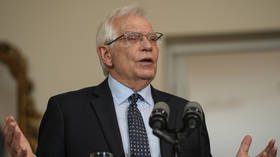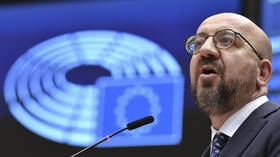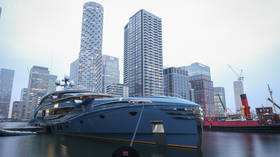Top EU diplomat wants to see frozen Russian assets seized
Citing a precedent with the Afghan central bank’s funds, Josep Borrell suggested using Russia’s assets to rebuild Ukraine

EU foreign policy chief Josep Borrell, citing the precedent with the Afghan central bank’s assets worth billions, suggested seizing frozen Russian foreign exchange reserves and using them to cover the costs of rebuilding Ukraine once the military conflict is over.
In an interview with FT published on Monday, Borrell said that in February, US President Joe Biden signed an executive order “to help enable certain US-based assets belonging to Afghanistan’s central bank, Da Afghanistan Bank, to be used to benefit the Afghan people.” In Borrell’s opinion, “it is full of logic” to use Russia’s assets for similar purposes.
“We have the money in our pockets, and someone has to explain to me why it is good for the Afghan money and not good for the Russian money,” he said.
Borrell stated that one of the most important questions now is: “Who is going to pay for the reconstruction of Ukraine?” As an “incredible amount of money” will be needed, and considering that the amounts raised in recent pledging conferences are just a “drop of water in the ocean,” the international community needs to come up with other ways to finance the rebuilding of the conflict-torn country, and using Russian reserves could be one way, he said.
His remarks echo previous statements by European Council President Charles Michel, as well as the White House. Speaking earlier this month to Interfax-Ukraine, Michel said he was “personally convinced” that freezing Russian assets is not enough and that “it is extremely important” for the West to be able “to confiscate them” and to make them available for Ukraine.
In late April, the White House presented a set of “comprehensive proposals” which included “establishing a streamlined administrative authority” that would be able to confiscate the assets of sanctioned “oligarchs” and transfer them to Kiev to “remediate harms of the Russian aggression.” Moscow decried the plans as “nothing but simple expropriation of private property that [the US] seeks to falsely justify.”
Since the beginning of the military operation in Ukraine in late February, half of Russia’s international reserves, around $300 billion, have been frozen as part of sanctions imposed by the US, EU, and allies. Russian Foreign Minister Sergey Lavrov said that Moscow could not have foreseen this development, and the freeze, in his opinion, essentially constitutes theft. The head of the central bank, Elvira Nabiullina, said that Russian assets have been frozen but not arrested or expropriated. She added, however, that Moscow considers the freezing of its reserves unprecedented and will challenge these decisions.
Thousands of Russian individuals have also been sanctioned, with their property and money seized or frozen by governments throughout Europe.
Russia attacked its neighboring state following Ukraine’s failure to implement the terms of the Minsk agreements, signed in 2014, and Moscow’s eventual recognition of the Donbass republics of Donetsk and Lugansk. The German and French brokered Minsk Protocol was designed to give the breakaway regions special status within the Ukrainian state.
The Kremlin has since demanded that Ukraine officially declare itself a neutral country that will never join NATO. Kiev insists the Russian offensive was completely unprovoked and has denied claims it was planning to retake the two republics by force.
The West condemned the attack and imposed sweeping sanctions on Russia. Moscow considers the measures unlawful and unjustified, and has retaliated by imposing counter-sanctions.
https://www.rt.com/russia/555182-eu-russia-reserves-seized/



0 Comments:
Post a Comment
Subscribe to Post Comments [Atom]
<< Home